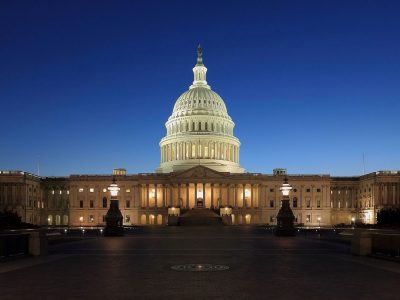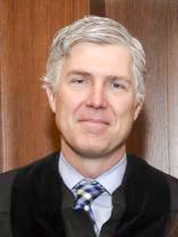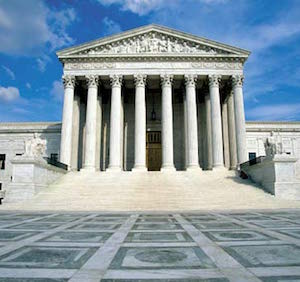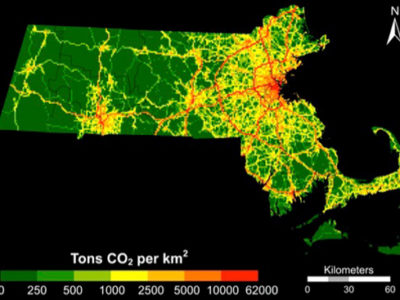Massachusetts v. EPA
Yes, Virginia, There ARE Federal Climate Laws.
Contrary to myth, Congress has actually passed laws relating directly to climate change.
It’s a common misconception that Congress has never passed any climate change legislation. But Congresshas passed at least laws regulating two powerful greenhouse gases, as well as a series of other laws stretching back almost forty years. The story begins under President Nixon and extends into the Biden years with the multi-billion dollar Inflation Reduction Act.
CONTINUE READINGState Government Standing and Environmental Law
The Supreme Court seems to be cooling to the idea of empowering state AGs.
Massachusetts v. EPA, the cornerstone climate case, contains an extensive discussion of standing which opens by saying that lawsuits by state governments are entitled to “special solicitude.” In the last few weeks of its term, the Supreme Court opined repeatedly on state standing. “Special solicitude” seems to be on the wane. Overall, I that might …
Continue reading “State Government Standing and Environmental Law”
CONTINUE READINGIndividuals Making a Difference
Two stories of the unknown environmental advocates behind major Supreme Court decisions.
My students often wonder whether they can actually make a difference. I like to tell them the story of Joe Mendelsohn. Mendelsohn, who worked at a tiny, obscure non-profit, decided that EPA needed to address climate change. His efforts, recounted in a book by Richard Lazarus, led to the Supreme Court’s blockbuster opinion in Massachusetts …
Continue reading “Individuals Making a Difference”
CONTINUE READINGWhat Does Today’s Decision Holding that Employers Can’t Discriminate Against LGBTQ Employees Have to Do with Climate Change?
The case provides potent ammunition for using the Clean Air Act to regulate carbon pollution
Today’s blockbuster opinion in Bostock v. Clayton County, Georgia, holding that employers can’t fire LGBTQ workers under Title VII of the Civil Rights Act, may seem far afield from the regulation of greenhouse gases under the Clean Air Act. But its reasoning could have huge implications for climate change action. In saying that discrimination …
CONTINUE READINGWhat Does Justice Kennedy’s Retirement Mean for Environmental Protection?
Short Answer: It’s Not Good
The news that Justice Anthony Kennedy is retiring has ramifications for many important areas in constitutional law, including affirmative action, same-sex marriage, and abortion. His vote was also pivotal in many environmental cases. Justice Kennedy will almost certainly be replaced by a more conservative justice. If that justice votes with the conservative wing of the …
Continue reading “What Does Justice Kennedy’s Retirement Mean for Environmental Protection?”
CONTINUE READINGClimate Policy in the Bay State
With a nudge from its courts, Massachusetts is pushing back against Trump’s climate agenda.
Even in 2006, it was clear that climate change is a serious threat to Massachusetts. That year, in its path-breaking decision on climate change, the Supreme Court gave Massachusetts standing to challenge the Bush Administration’s refusal to regulate greenhouse gases. The basis for standing was impact of sea level rise on the state. It now …
Continue reading “Climate Policy in the Bay State”
CONTINUE READINGGuest Blogger Gregory Dotson: Is Scott Pruitt Calling for an Amendment to the Clean Air Act?
EPA Administrator Resorts to Misleading Rhetoric in Possible Prelude to Revisiting Massachusetts v. EPA
Since he was confirmed to lead the U.S. Environmental Protection Agency six months ago, Administrator Scott Pruitt has relied on three points when discussing the issue of climate change. He has cast doubt on the science by claiming it’s difficult to know the human role “with precision.” He has questioned the ability of the agency …
CONTINUE READINGGuest Blogger Ben Levitan: The Tenth Anniversary of Massachusetts v. EPA
The opinion stands for EPA’s responsibility to address climate change based on law and science, and to safeguard public health and the environment under adverse political conditions
If it feels like we’re being inundated with bad news about federal climate policy, here’s a cause for hope: this month marks the tenth anniversary of the Supreme Court’s decision in Massachusetts v. EPA, one of the most important environmental cases in our nation’s history. The Supreme Court’s landmark decision in Massachusetts came when the …
Continue reading “Guest Blogger Ben Levitan: The Tenth Anniversary of Massachusetts v. EPA”
CONTINUE READINGA Yawning Credibility Gap
Courts are supposed to defer to agencies. But that happens less often when an agency lacks credibility.
Two themes in the Trump Administration are distrust of experts and a willingness to overrule them on ideological grounds. But undermining the government’s claims to expertise may come back to haunt the Administration. Because Trump is marginalizing government scientific and economic expertise, his regulatory initiatives may get less deference from the courts. There is already a great deal of concern …
Continue reading “A Yawning Credibility Gap”
CONTINUE READINGFDA Discretion and Animal Antibiotics
FDA has stalled for 30 years in regulating antibiotics in animal feed. A court says that’s O.K.
The FDA seems to be convinced that current use of antibiotics in animal feed is a threat to human health. But the Second Circuit ruled recently in NRDC v. FDA that EPA has no duty to consider banning their use. That may seem ridiculous, but actually it’s a very close case legally. The court’s discussion of Massachusetts …
Continue reading “FDA Discretion and Animal Antibiotics”
CONTINUE READING











